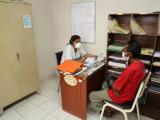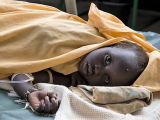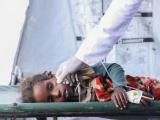Jan 10, 2012
Study: No sign that anthrax vaccine impaired health of lab workers
A survey study found no evidence that anthrax vaccination impaired the physical or mental health of laboratory workers within 30 months after they started the series of shots, according to a report in Vaccine. Researchers at the Centers for Disease Control and Prevention studied data from Laboratory Response Network (LRN) staff members who received Anthrax Vaccine Adsorbed (AVA) under a federal recommendation that was issued in 2002 (but was withdrawn in 2005, after a lawsuit forced a temporary suspension). The investigators enrolled 437 LRN workers who received the six-dose series of anthrax shots and 139 LRN workers who were not vaccinated. All the lab workers took a survey of physical and mental health, called SF-36v2, at 0, 12, and 30 months. Scores on the survey can range from 0 to 100, with an estimated national average of 50. For physical scores, the average change from baseline to 30 months was -1.09 for vaccinated persons and -1.97 for controls (P = .23). For mental functioning, the average change at 30 months was -2.11 for vaccinated workers and -0.24 for controls (P = .06). In a multivariable analysis, the difference in mental scores for vaccinees versus controls at 30 months was reduced (P = .37), but the other findings were similar. "While these results provide some level of reassurance related to the long-term effects of AVA, studies involving experimental controls, randomization, and a longer time frame would be useful additions to our findings," the report says.
Jan 8 Vaccine abstract
Haiti cholera reports explore social media, likely index patient
To observe the second anniversary of an earthquake that devastated parts of Haiti, the American Journal of Tropical Medicine and Hygiene has published a section on Haiti in its January issue, which includes a commentary on the cholera outbreak and reports on how media sources tracked the outbreak in its early stages and on a patient suspected to be the first case in the outbreak.
Jan 9 EurekAlert press release on the special section
January Am J Trop Med Hyg perspective piece
In the media report, researchers from Children's Hospital in Boston and Harvard Medical School used a tool called HealthMap to glean surveillance information from the Web news media, blogs, and discussion during the first 100 days of the cholera outbreak. They also analyzed cholera-related Twitter posts from the same time period. Assessments of disease activity from the online sources were immediately available and sometimes closely matched official health ministry assessments that came out weeks later. The group concluded that social media monitoring can be a useful early-outbreak tool, even in resource-limited settings.
January Am J Trop Med Hyg abstract on social media in cholera outbreak
The report on a possible index patient describes the illness and death of a 28-year-old man who probably died from the disease in Mirebalais, where the outbreak began, in mid October 2010. Shortly afterward, the city recorded its first cholera hospitalizations. The patient had a severe psychiatric illness and frequently bathed and drank from the local river, despite having access to clean water in his home. The river he drank from is fed by the river linked to the probable contamination source, a United Nations peacekeepers camp. The authors, from Bingham and Women's Hospital and Harvard Medical School, both in Boston, wrote that case illustrates the importance of mental health services in global health and shows how global health requires an understanding of community-level details.
January Am J Trop Med Hyg abstract on Haiti's "first" cholera case
Haiti's cholera outbreak began in October 2010. Though the rate of new infections has slowed, the outbreak has sickened nearly 500,000 people and killed more than 6,500.
US developer, Chinese firm sign agreement on TB vaccine research
Rockville, Md.-based Aeras, a non-profit developer of tuberculosis (TB)vaccine candidates, and the China National Biotec Group (CNBG), the country's largest biotechnology firm, announced today that they have reached a final agreement to jointly develop new TB vaccines. Aeras will help research institutes operating under the umbrella of CNBG develop a strategy for joint development, manufacturing, and distribution of affordable new TB vaccines for global use, according to an Aeras press release. "CNBG has a great deal of expertise and energy to invest in this partnership," said Xiaoming Yang, president of CNBG, in the release. "Not only is TB a public health crisis of the developing world, it is also a priority health issue here in China." As part of this collaboration, Aeras will license its recombinant BCG (rBCG) platform and other technologies to CNBG to help create better and longer-lasting protection against TB, officials said.
Jan 10 Aeras press release



















